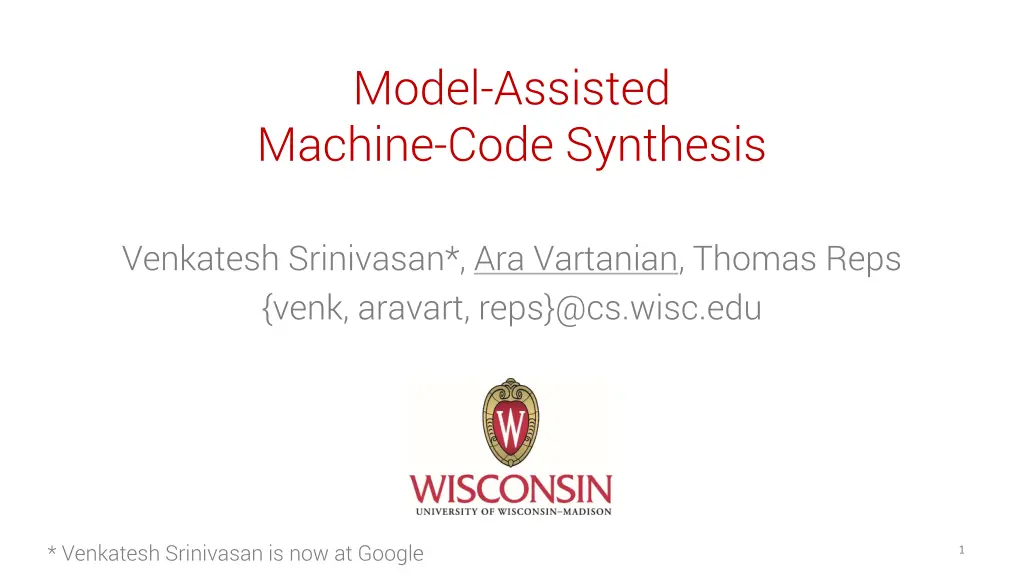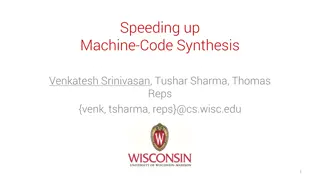
Semantics-Based Binary Rewriter and McSynth++ Optimization
Explore the world of binary rewriting, superoptimization, and McSynth++ optimization techniques. Discover how this innovative technology aims to speed up machine code synthesis for improved efficiency and performance in software systems.
Download Presentation

Please find below an Image/Link to download the presentation.
The content on the website is provided AS IS for your information and personal use only. It may not be sold, licensed, or shared on other websites without obtaining consent from the author. If you encounter any issues during the download, it is possible that the publisher has removed the file from their server.
You are allowed to download the files provided on this website for personal or commercial use, subject to the condition that they are used lawfully. All files are the property of their respective owners.
The content on the website is provided AS IS for your information and personal use only. It may not be sold, licensed, or shared on other websites without obtaining consent from the author.
E N D
Presentation Transcript
Model-Assisted Machine-Code Synthesis Venkatesh Srinivasan*, Ara Vartanian, Thomas Reps {venk, aravart, reps}@cs.wisc.edu * Venkatesh Srinivasan is now at Google 1
Software is Pervasive Binaries are [Motivation] Software is everywhere Everyday systems: phones, laptops, watches, cars, etc. Critical systems: aircrafts, space shuttles, medical devices, etc. Binaries are 01000101011 11110101010 10010001010 11111101010 Binary 00101010101 11010101010 10010001010 11111101010 No source No source code code No No documentation documentation Analyze Binaries Rewrite Binaries 2
Binary Rewriting [Motivation] Superoptimization 0100010 Binary 1011101 Partial Evaluation 01000101011 11110101010 10010001010 11111101010 Binary 00101010101 11010101010 10010001010 11111101010 Why rewrite binaries? Program Repair 1101010 Binary 0010111 Binary Rewriter Obfuscation 0111101 Binary 0010111 Partial Evaluation Slicing 3
Inside a Semantics-Based Binary Rewriter * Binary Analyses [Motivation] Machine-Code Synthesizer Disassembly of section .text: Rewritten Binary Rewritten Binary Offline binary optimization 080482e0 <.text>: 80482e0: xor ebp,ebp 80482e2: pop esi 80482e3: mov ecx,esp 80482e5: and esp, 0xfffffff0 80482e8: push eax 80482e9: push esp 80482ea: push edx 80482eb: push 0x80483d0 80482f0: push 0x80483e0 80482f5: push ecx 80482f6: push esi 80482f7: push 0x80483a5 80482fc: call 80482c4 . . 8048394: push ebp 8048395: mov ebp, esp 8048397: sub esp, 0x10 804839a: mov eax, [ebp + 8] 804839d: mov [ebp-4], eax 80483a0: mov eax, [ebp-4] . . 80483c0: mov eax, [ebp-4] 80483c3: leave 80483c4: ret 080482e0 <.text>: 80482e0: xor ebp,ebp 80482e2: pop esi 80482e3: mov ecx,esp 80482e5: and esp, 0xfffffff0 80482e8: push 1 80482e9: push 2 80482ea: push 3 80482eb: push 0x80483d0 80482f0: push 0x80483e0 80482f5: push ecx 80482f6: push esi 80482f7: push 0x80483a5 80482fc: call 80482c4 . . 8048394: lea esp, [esp 4] 8048395: mov ebp, esp 8048397: sub esp, 0x10 804839a: mov eax, 10 804839d: mov [ebp-4], eax 80483a0: mov eax, 20 . . 80483c0: mov [ebp-4], eax 80483c3: leave 80483c4: ret Partial evaluation Transformed Semantics Binary obfuscation Slicing Semantic Representation McSynth++ Transform Logical Formula Binary repair Transformed Semantics Semantic Representation McSynth++ Transform * V. Srinivasan, T. Sharma, and T. Reps. Speeding up Machine-Code Synthesis. In OOPSLA, 2016 4
McSynth++ is not fast enough! [Motivation] Rewriter makes Rewriter makes many calls to many calls to McSynth McSynth++ We need to speed-up McSynth++! Each call to Each call to McSynth McSynth++ minutes minutes Superoptimization 0100010 Binary 1011101 ++ takes takes ++ Partial Evaluation 01000101011 11110101010 10010001010 11111101010 Binary 00101010101 11010101010 10010001010 11111101010 Binary Rewriter Program Repair 1101010 Binary 0010111 Obfuscation Analysis Transformation Synthesis McSynth++ McSynth-ML 0111101 Binary 0010111 Partial Evaluation Time taken to Time taken to rewrite a binary rewrite a binary several hours or several hours or days! days! Slicing 5
Outline Motivation Intel x86 (IA-32) Primer McSynth++ McSynth-ML Experiments Conclusion 6
Intel x86 (IA-32) Primer [Background] Registers 20 EBX 1000 ESP 20 EAX 996 1000 20 40 Stack push eax mov ebx, eax mov [esp], 40 lea esp, [esp+4] 7
Outline Motivation Intel x86 (IA-32) Primer McSynth++ McSynth-ML Experiments Conclusion 8
Synthesis of Machine Code* [McSynth++] ESP = ESP 4 Mem = Mem[ESP 4 EAX] Synthesize machine-code instructions from a semantic specification QFBV formula Parameterized by ISA push eax ESP = ESP 4 Mem = Mem[ESP 4 EAX] EBP = EBP EAX = EAX EBX = EBX ... CF = CF OF = OF McSynth++ lea esp, [esp 4] push eax mov [esp], eax ESP = ESP 4 Mem = Mem[ESP 4 EAX] push eax lea esp, [esp 4];mov [esp], eax ESP = ESP 4 Mem = Mem[ESP 4 EAX] * V. Srinivasan and T. Reps. Synthesis of machine code from semantics. In PLDI, 2015 V. Srinivasan, T. Sharma, and T. Reps. Speeding up machine-code synthesis. In OOPSLA, 2016 9
Enumerative Synthesis Challenges [McSynth++] 43,000 unique IA-32 instruction schemas Exponential cost of enumeration + = Synthesis of an instruction Synthesis of an instruction sequence of length 2 takes sequence of length 2 takes several hours or days! several hours or days!
McSynth++ Design [McSynth++] m,1 'm,1 Slave I1 T I'1 Slave I . . . . . m-1,1 1,1 m,2 . . . I2 I'2 'm,2 Slave Master 1,2 m-1,k m,n In Slave 11
McSynth++ Design [McSynth++] Few seconds Slave 1 : EAX = Mem(ESP + 10) mov eax, [esp+10] : : EAX = Mem(ESP + 10) ESP = ESP + 18 ZF = (ESP + 10 = 0) Master 2 : ESP = ESP + 18 ZF = (ESP + 10 = 0) add esp, 10 lea esp, [esp+8] Slave 10 minutes 12
McSynth++ Slave [McSynth++] Slave Synthesizer Footprint-Based Pruner Bits-Lost-Based Pruner 1 I Instruction Enumerator CEGIS Prunes useless candidates Instantiation of counterexample- guided inductive synthesis framework for machine code Search Space (Instruction sequences) 13
McSynth++ Slave [McSynth++] Space of instruction sequences One-instruction sequences Two-instruction sequences . .. .. .. .. .. .. . Three-instruction sequences Slave performs no Slave performs no prioritization of prioritization of candidates candidates Not all candidates Not all candidates are equally likely to are equally likely to implement implement Linear search 14
Outline Motivation Intel x86 (IA-32) Primer McSynth++ McSynth-ML Experiments Conclusion 15
McSynth-ML Key Insight [McSynth-ML] Prioritize candidates Retain completeness properties Linear search Best-first search assisted by models 16
McSynth-ML Design [McSynth-ML] McSynth++ McSynth-ML Master Master Slave- ML Slave-ML Slave-ML . . . . . . . . Slave Slave Slave Model-assisted slave: Faster enumerative synthesis I1 I2 In I1 I2 Im 17
Training Corpus [McSynth-ML] Corpus of Specification, Implementation pairs Search Machine-code Synthesizer Instruction sequence QFBV Symbolic execution Instruction sequence InstrToQFBV QFBV Corpus of , I pairs 18
Learning Models [McSynth-ML] Language model n-gram push ebp; mov ebp, esp is more common than push ebp; xor ebp, esp n-gram Corpus of , I pairs Regression model k-nearest neighbors If contains + 8/16/32 operator, I most likely will contain add , sub , or lea opcodes If contains +8 operator, I most likely will contain 8-bit operands k-NN 19
ModelAssisted Best First Search [McSynth-ML] Space of instruction sequences N-gram score: How common is I? Next prefix to expand? Next prefix to expand n-gram K-NN score: How well do features of I correlate with features of ? k-NN mov esp, <imm> add esp, <imm> add esp, <imm> mov esp, <imm> . . . . . . add esp, <imm> add esp, <imm> mov esp, [esp] add esp, <imm> Model scores add esp, <imm> mov esp, <imm> 20
Optimization Instruction-Pool Truncation [McSynth-ML] Space of instruction sequences n-gram k-NN k-NN 21
Outline Motivation Intel x86 (IA-32) Primer McSynth++ McSynth-ML Experiments Conclusion 22
Test Suite [Experiments] Important instruction-sequences from real-world programs SPECINT 2006 benchmarks (10 binaries) Instruction-sequences of length 5 through 10 50 instruction-sequences in total No overlaps I Symbolic Symbolic Execution Execution I McSynth++ McSynth++ No restriction on source of QFBV formula 23
Training Corpus [Experiments] Training Corpus Test Input Binary1 Binary2 Binary3 Binary10 . . . . It {I1, I2, I3, , In} Sym Sym Exec Exec Sym Sym Exec Exec t { 1, 2, 3, , n} Corpus of , I pairs 24
McSynth-ML Vs. McSynth++ [Experiments] 100000 Synthesis time - McSynth-ML (seconds) No. of timeouts: 6 Vs. 0 Avg. speedup for formulas that timed out in McSynth++: over over 526X Avg. speedup for remaining formulas: 4.55X 4.55X (12.6X 12.6X for formulas with baseline synthesis-time > 100s) 6 Vs. 0 (out of 50) 10000 526X 1000 100 10 1 1 10 100 1000 10000 100000 Synthesis time - McSynth++ (seconds) 25
Experiments Summary [Experiments] Search strategy Linear Model-assisted best-first Instruction-pool truncation via k-NN Speedup for formulas that timeout Speedup for formulas that timeout Speedup for remaining formulas Speedup for remaining formulas No. of timeouts No. of timeouts No At least 38 1.78 6 -- -- 0 At least 200 4 At least 526 4.55 Yes 0 0 26
Conclusion Use of Machine Learning to make machine-code synthesis smarter and faster Best-first search assisted by models n-gram language model k-NN regression model Prioritization of candidates Retains completeness Over 526X speedup for formulas that timed out in McSynth++ 4.55X speedup for remaining formulas 27
Questions? Space of instruction sequences n-gram k-NN k-NN 28
Master in McSynth++ : EAX = Mem(ESP + 4) EBX = ((EAX * 2) >> 2) + EAX Mem = Mem[ESP EAX] Flow Legal Split independence 2: EAX = Mem(ESP + 4) EBX = ((EAX * 2) >> 2) + EAX 3 : EBX = ((EAX * 2) >> 2) + EAX 1: Mem = Mem[ESP EAX] 4: EAX = Mem(ESP + 4) Mem(ESP) and Mem(ESP +4) could never alias 29
Flattening Deep Terms 3 : EBX = ((EAX * 2) >> 2) + EAX Equisatisfiable Scratch Locations (Dead Registers) = {EBX} 3 : m = EAX * 2 n = m >> 2 EBX = n + EAX 6 : n = m >> 2 7 : EBX = n + EAX 5 : m = EAX * 2 7 : EBX = EBX + EAX 5 : EBX = EAX * 2 6 : EBX = EBX >> 2 30
Master in McSynth++ : EAX = Mem(ESP + 4) EBX = ((EAX * 2) >> 2) + EAX Mem = Mem[ESP EAX] Master+ + 4 : EAX = Mem(ESP + 4) 1 : Mem = Mem[ESP EAX] 7 : EBX = EBX + EAX 5 : EBX = EAX * 2 6 : EBX = EBX >> 2 31
Footprint-Based Search-Space Pruning 1: Mem = Mem[ESP 4 EBP] Abstract semantic Footprint Sound abstraction of locations that might be used or modified by a QFBV formula SFP#use SFP#use( 1) = {ESP, EBP} SFP#kill( 1) = {Mem } Instruction Enumerator SFP#kill SFP#use( ) = { } SFP#kill( ) = {EAX } SFP#kill( ) = {EAX , EBX } SFP#use( ) = {ECX} push eax mov eax, <imm> mov eax, <imm> mov eax, <imm> mov esp, <imm> add esp, <imm> mov eax, <imm> mov ebx, ecx : EAX = imm ^ : EAX = imm EBX = ECX Useless Prefix 32
Bits-Lost-Based Pruning 7 requires pre-state bits in EBX loses the pre-state bits in EBX when it transforms the state Prunes a candidate if does not retain enough bits to implement 7 Retains a candidate if pre-state bits required to implement 7 are possibly latent in 7 : EBX = EBX + EAX Instruction Enumerator Slave mov ebx, eax sub ebx, eax : EBX = EAX : EBX = EBX - EAX 33
Synthesis Vs. Compilation Finds several implementations of varying qualities Can handle more general formulas (implicit form), e.g., EAX + EBX = EAX + EBX + 4 Finds a single implementation Only handles state- transformation formulas (explicit form) 34
Synthesis Vs. Superoptimization Machine-code synthesis is more general than superoptimization: superopt(I) = synthOpt(InstrToQFBV(I)) Input to synthesizer is QFBV formula, not an instruction sequence Superoptimizer cannot handle more general QFBV formulas such as EAX + EBX = EAX + EBX + 4 35
Effect of McSynth++ on a Client WiPEr: Machine-code partial evaluator * Total time to synthesize residual code: McSynth Vs. McSynth++ Application LOC No. of calls to synthesizer Synthesis time using McSynth (seconds) Synthesis time using McSynth++ (seconds) Speedup power 19 6 16 13.5 1.19 interpreter 71 19 30 22.8 1.32 sha1 140 23 25.4 21 1.21 filter 107 212 241 177 1.36 dotproduct 29 306 312 267 1.17 Average speedup: 1.25X Effect of McSynth-ML: no significant speedup Small input formulas * V. Srinivasan and T. Reps. Partial Evaluation of machine code. In OOPSLA, 2015 36










